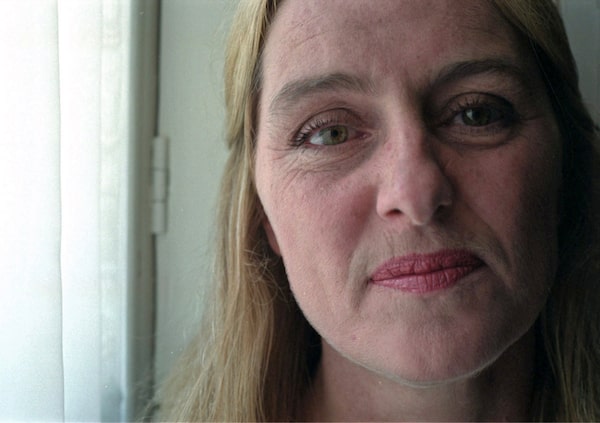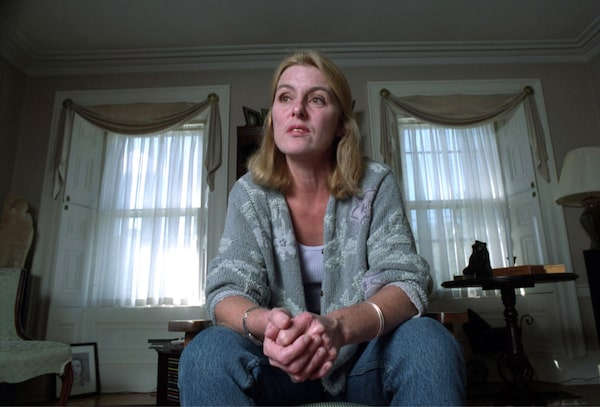
Janet Conners underwent a cancer biopsy on Aug. 4, which revealed stage 4 lung cancer. She spent the last two weeks of her life in a palliative care facility.Scott Munn/The Globe and Mail
On April 14, 1993, then Nova Scotia health minister George Moody announced that the province would be providing compensation to a couple who had contracted HIV from tainted blood.
“I did this because I felt it was right. … It’s an issue of compassion,” he said at the time.
The move, a direct response to the personal and public pleas of Janet and Randy Conners, turned out to be more monumental than anyone could have ever imagined.
The political dominoes began to tumble, with every province and territory following suit on compensation and the federal government ordering a commission of inquiry – the Krever Commission – that would eventually result in more than $5-billion in compensation, the bankruptcy of the iconic Canadian Red Cross blood program, and complete revamping of how drugs are approved in this country.
The woman who helped trigger that seismic shift, Janet Conners, died of lung cancer on Aug. 20. She was 66.
While many activists and lawyers were engaged in the fight for justice for thousands of victims of tainted blood, it’s impossible to overstate the role that Ms. Conners played, said Douglas Elliott, a lawyer who served for counsel for the Canadian AIDS Society at the Krever commission.
“Janet broke down the wall of resistance and changed Canada forever,” he said.
Janet Pritchard was born in Vancouver, where she spent her childhood, before her family moved to Yellowknife and Nelson, B.C., cities where her father, Donald, worked as prison warden, and her mother in various government jobs.
Janet was a middle child and joked that made her a natural-born advocate. “I was middle of six, so you kind of have to be an activist. ‘Hey, I need some food’ – you had to lobby for your survival,” she said in an interview with the AIDS Activist History Project.
Ms. Pritchard married young, and briefly, and bore a son, Angus. As a single mother in 1981, she moved to Halifax, to be closer to other family members.
In 1984, on a night out with girlfriends at the Misty Moon, she met Randy Conners. The attraction was immediate, and mutual. He was a computer specialist at Veterans Affairs, and she was a lab tech at the infectious disease clinic of Victoria General Hospital.
Mr. Conners was also a hemophiliac.
In the early 1980s, AIDS was spreading like wildfire in the gay community, with men dying by the thousands. But the newly discovered virus was spread not only by unprotected sex, but also blood, putting hemophiliacs and transfusion recipients at risk.
The Canadian Red Cross downplayed those risks to the point of denial.
Nonetheless, Ms. Pritchard urged her new beau to get tested. He was, after years of using contaminated blood products, unsurprisingly, positive. Mr. Conners was also nonplussed. Hemophiliacs were told that they were merely “carriers,” that only gay men would get sick.
The couple married in 1987. They practised safer sex but, in 1989, Janet Conners tested positive too. At age 33, she was told she likely had six months to live.
“I remember that day vividly,” her sister Ruth Pritchard said. “She was angry, and I was angry. Janet was mostly worried that Gus would be an orphan.”
Ms. Pritchard said one the most difficult things for her sister was telling her parents that she was infected with HIV. “They were devastated but never anything but supportive,” she said.
In late December, 1989, the federal government quietly announced a “humanitarian assistance” package for hemophiliacs who contracted AIDS from tainted blood: $120,000 over four years, with the assumption being they would all be dead by then. The provinces, for their part, signed a pact, saying none of them would provide additional money.

AIDS activist Janet Conners in Halifax on Sept. 22, 2000. Ms. Conners described the federal program for hemophiliacs who contracted AIDS from tainted blood as 'blood money'.Scott Munn/The Globe and Mail
Janet Conners described the federal program acidly, as “blood money, shut-up-and-die” money. She was also irked that it did not provide for the secondarily-infected victims like her, or for the children of those who died from tainted blood.
As media exposés revealed details of the depth and breadth of the failures of the Canadian Red Cross and government regulators to protect recipients of blood and blood products, activists became more vocal and angry, especially that the paltry federal compensation was running out.
Janet and Randy Conners began lobbying the province quietly – they met the health minister, Mr. Moody, several times – but eventually decided to go public. In an initial CBC story, the couple was identified as “Jack and Jill,” but they would quickly abandon anonymity to be more impactful.
The story captured the public imagination. The Conners were, after all, perceived as innocent victims of the AIDS epidemic, and of government malfeasance. (As opposed to men who have sex with men, who were often blamed for their predicament.) Ms. Conners was also one of the first women in Canada with HIV, and the media interviews she gave were electrifying.
In the spring of 1993, Randy Conners was gravely ill in hospital. Mr. Moody ordered provincial government officials to create a compensation package, and quickly.
The Conners were offered $30,000 annually tax-free, a $50,000 life insurance payment, and four years of free college education for their son. The offer was extended to about 25 other members of families in the province who has also contracted HIV-AIDS from tainted blood.
Rather than take the win and quietly return to anonymity, Ms. Conners decided to continue her activism so victims across the country would be compensated.
On Sept. 15, 1993, the provinces and territories announced a joint compensation plan, after years of insisting they would never do so.
The next day, the government of Brian Mulroney announced a sweeping Commission of Inquiry, led by Mr. Justice Horace Krever.
On Sept. 13, 1994, Randy Conners died of AIDS at age 38. The heart-wrenching photos of him on his deathbed, with Janet by his side, ratcheted up the pressure.
The damning evidence from the Krever inquiry led to numerous lawsuits and gradual expansion of compensation programs, notably to people infected with hepatitis C by blood products and transfusions.
Ms. Conners continued to be a crusading activist. She served as president of the Nova Scotia Haemophiliac Society, vice-chair of the AIDS Coalition of Nova Scotia, and a member of the Canadian Treatment Action Coalition. She dedicated much of her time to improving the lot of women living with HIV-AIDS.
“She was Canada’s most respected AIDS activist,” Mr. Elliott said.
He particularly appreciated that “Janet rejected the ‘innocent victims of AIDS’ nonsense, noting that she got AIDS the same way gay men did – by having sex.”
As someone who lived more than three decades with HIV-AIDS, including taking powerful cocktails of drugs, Ms. Conners had her share of health problems, including a heart attack at age 42 (likely due to the toxic effect of the drugs). About five years ago, she also had a near fatal car crash, breaking almost every bone in her body.
“It was like she had nine lives,” Mr. Elliott said.
Ms. Conners’s activism was recognized with a number of awards, including the Governor-General’s Meritorious Service Medal and the Nova Scotia Human Rights Award.
She was also the recipient of three honorary doctorates, from Dalhousie University, Acadia University and Mount Saint Vincent University. As someone who never attended university, took great pleasure in referring to herself jokingly as “Dr. Conners.”
Ms. Pritchard said that while her sister had a very public life, she had a quiet private side as someone who loved gardening and exchanging recipes, and a lifelong streak of derring-do.
To mark her 40th birthday, Ms. Conners went skydiving. At 50, it was a complete body shave. At 60, a more contemplative dinner with all her surviving family members.
“I didn’t have plans for old age or anything,” she once said. “None of us in the AIDS community did.”
Ms. Conners also doted on her grandchildren. In fact, she had moved to Sydney, N.S., to be near her son Gus and his three children: Gauis, Loxley and Loupin.
In early August, Ms. Conners was feeling run down and visited her doctor. She underwent a cancer biopsy on Aug. 4 that revealed stage 4 lung cancer, and spent the last two weeks of her life in a palliative care facility.
“I hope people remember Janet for her bravery and her tenacity,” Ms. Pritchard said. “I mean, she had guts.”
André Picard is the Globe and Mail’s health columnist and the author of The Gift of Death: Confronting Canada’s Tainted Blood Tragedy.
 André Picard
André Picard